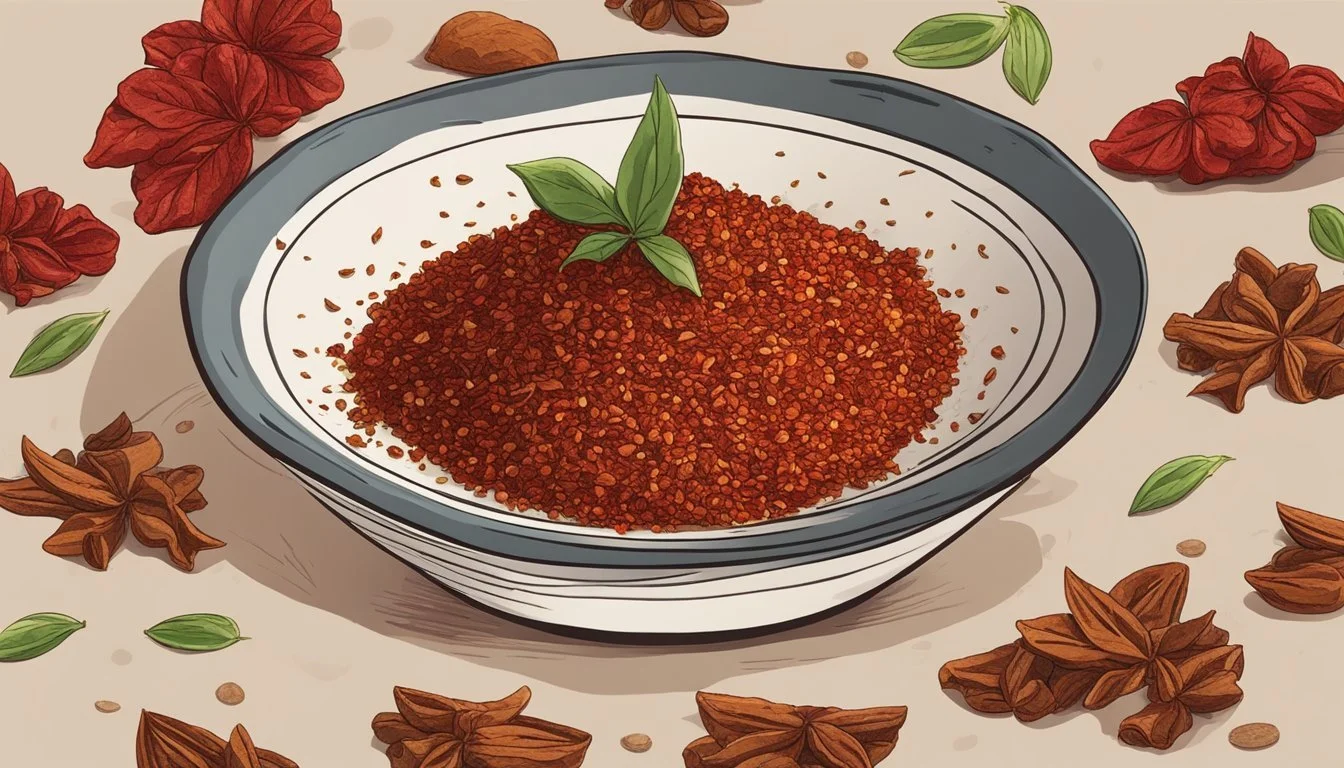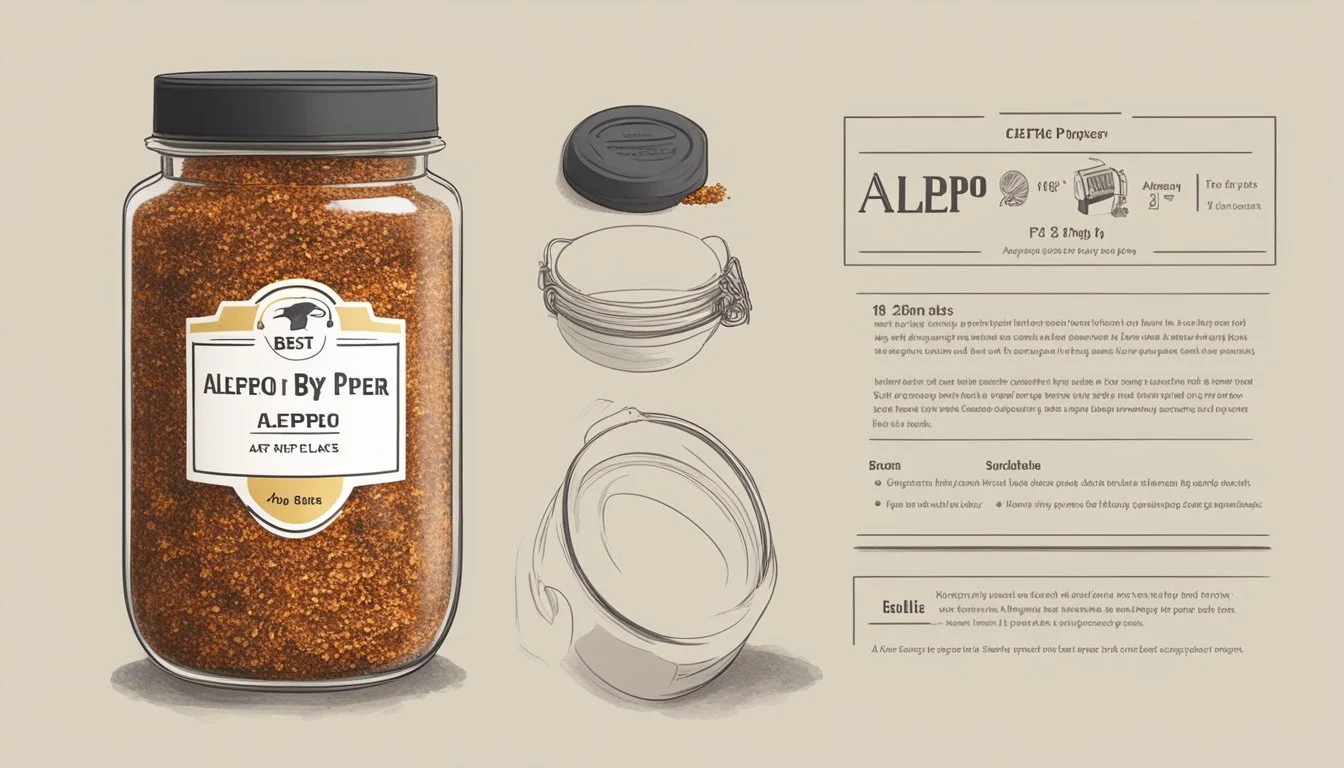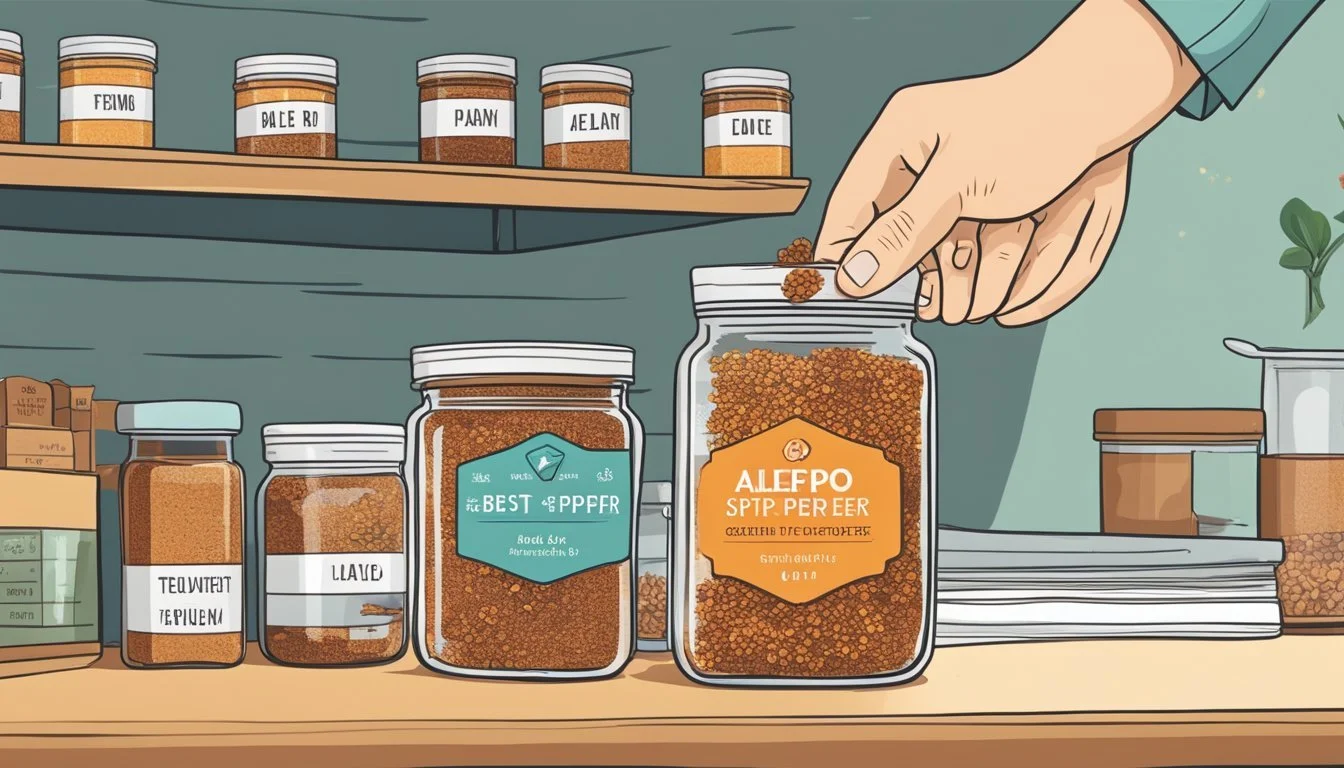How Long Do Aleppo Pepper Flakes Last?
Shelf Life and Storage Tips
Aleppo pepper, a spice derived from Halaby chile peppers, hails from Syria and carries a unique flavor profile—an amalgamation of mild heat, a tangy taste with a hint of fruitiness, often compared to the essence of sundried tomatoes. It is a versatile ingredient, commonly used in Mediterranean and Middle Eastern cuisines to add depth and complexity to dishes. The dried flakes of Aleppo pepper, with their bright, tart, earthy, and slightly salty flavors, are cherished by culinary enthusiasts for their ability to elevate the taste of a myriad of recipes.
The shelf life of Aleppo pepper flakes, like other dried spices, is subject to proper storage conditions. They must be kept in a cool, dark, and dry place, ideally in an airtight container to minimize exposure to moisture and air, which can lead to a loss of potency over time. Although dried spices don't typically spoil in the way fresh produce might, the intensity of their flavors can diminish, making the assessment of their longevity crucial for maintaining the desired quality in culinary applications.
When stored optimally, Aleppo pepper flakes can retain their flavor for an extended period, often up to two to three years. However, to ensure their vibrant taste and aromatic qualities, it is recommended to use within six months to a year, as the potency of the spice's flavor characteristics tend to be at their peak during this time. Regularly checking the scent and taste can serve as a practical indicator of their freshness and effectiveness in cooking.
Origins and Characteristics
Aleppo pepper, also known as halaby pepper, is a variety prized for its rich flavor profile and significance in regional cuisines. Originating from the Syrian city of Aleppo, this pepper has adapted to similar climates, retaining its unique characteristics across regions.
Aleppo Pepper Profile
Aleppo pepper flakes are derived from the burgundy-colored pods of the Capsicum annuum species. Renowned for their complex flavor profile, they offer a perfect balance between fruitiness and mild heat. The typical heat level ranges from 10,000 to 20,000 Scoville units, making them moderate in spiciness. Its flakes are known for their deep red color and tangy aroma, adding more than just heat to dishes.
Regional Significance
Historically associated with the Syrian city of Aleppo, a key trading hub, aleppo pepper has played a significant role in the culinary traditions of the Middle East. Due to recent events in Syria, production has largely moved to Turkey, where it is now predominantly cultivated. Regardless of its growing location, it remains an emblematic spice of Mediterranean cuisine.
Culinary Uses
In the kitchen, aleppo pepper's mild heat and rich flavor make it a versatile addition. It enhances the taste of chicken, fish, and eggs, and elevates dips, grilled vegetables, and more. Unlike standard crushed red pepper (how long does crushed red pepper last?), aleppo flakes contain no seeds, contributing to their milder heat and slightly oilier texture with a hint of saltiness.
Storage Fundamentals
The longevity of Aleppo pepper flakes is significantly influenced by their storage. Optimal storage practices are crucial to maintain the unique flavor and freshness.
Appropriate Containers
For the preservation of Aleppo pepper flakes, an airtight container is essential. This type of container guards against flavor loss by preventing air and moisture from coming into contact with the spices. Glass or plastic with a tight-sealing lid works well for this purpose.
Material: Glass or plastic
Lid: Must seal tightly
Effectiveness: Prevents air and moisture intrusion
A correct container choice helps in maintaining the potency of the Aleppo pepper flakes, ensuring they deliver the intended flavor profile when used.
Ideal Conditions
Aleppo pepper flakes retain their quality best when kept in a cool, dark location such as a pantry or spice cabinet away from direct sources of heat. Consistent temperature and protection from light exposure are paramount to prevent degradation of the spices.
Temperature: Stable and cool
Location: Away from heat and light
Environment: Dry
Storing the flakes in such conditions helps to ward off the negative impacts of light, air, and moisture, all of which can significantly reduce the spice's shelf life and flavor integrity.
Shelf Life and Freshness
Proper storage can significantly impact the shelf life of Aleppo pepper flakes, ensuring they maintain their distinctive flavor and aroma. These spices are known for their long-lasting freshness when stored correctly.
Determining Freshness
The freshness of Aleppo pepper flakes can be assessed by their color, aroma, and texture. Fresh flakes should exhibit a deep red hue and a complex, fruity scent with a slightly tangy and spicy undertone. They should feel dry to the touch, without any clumps that might suggest moisture exposure.
Color: Bright, deep red indicates a fresh product.
Aroma: Should be rich and reflective of a fruity and tangy profile.
Texture: Crisp and dry flakes suggest they are fresh and free from moisture.
Maximizing Potency
To ensure the potency of Aleppo pepper flakes in terms of flavor and shelf life, proper storage is key. They should be kept in a cool, dark place away from direct sunlight to protect them from heat and UV damage, which can diminish their quality. An airtight container is ideal to prevent moisture and air from altering their texture and aroma.
Avoid Light and Heat: Store in a dark cupboard or drawer.
Airtight Storage: Use containers with tight-fitting lids.
Cool Temperature: A pantry or cabinet away from appliances that generate heat.
When stored under these conditions, Aleppo pepper flakes can retain their quality for about 1-2 years before gradually losing their potency.
Culinary Applications
Aleppo pepper flakes are renowned for their ability to enrich a dish's flavor profile with their mild heat and fruity qualities. They serve as a versatile ingredient in kitchens, adept at both subtle flavor enhancement and bold seasoning.
Flavor Pairings
Aleppo pepper flakes exhibit a unique balance of sweetness, tartness, and a mild spiciness, which allows them to pair well with a wide array of ingredients. Notable pairings include:
Meats: Their rich, deep flavor complements the savory aspect of meats, making it a favorite for rubs and marinades.
Eggs: A sprinkle on eggs can transform a simple breakfast into a more interesting meal.
Pizza: As a condiment, the flakes add a flavorful twist to the classic pizza without overpowering it.
Recipe Enhancement
Incorporating Aleppo pepper not only amplifies the flavors of a dish but also provides a subtle complexity that many other spices cannot achieve. Here are specific ways it enhances recipes:
Marinade: When used in a marinade, Aleppo pepper imbues meats with a rich, tart profile that penetrates deeply for a lasting taste.
Dips: It elevates the taste of dips, offering a slight kick while introducing a subtle fruitiness that complements both creamy and tomato-based varieties.
Comparison to Other Spices
When evaluating the shelf life of Aleppo pepper flakes, it is essential to understand how they fare compared to other spices, particularly other chile flakes. These comparisons are not just about duration but also encompass flavor profiles and heat levels, which can influence how and when they are substituted in recipes.
Aleppo vs. Other Chile Flakes
Aleppo pepper flakes are known for their mild to moderate heat and a unique combination of fruity, tangy, and slightly sweet notes. They are milder than cayenne pepper and red pepper flakes (how long do red pepper flakes last?), which offer a more intense, straightforward heat. The comparison table below illustrates these differences in heat levels and flavor notes:
Spice Heat Level Flavor Notes Aleppo Pepper Mild to Moderate Fruity, tangy, slightly sweet Red Pepper Flakes Moderate to High Heat with less complexity Cayenne Pepper High Sharp, pungent
While red pepper flakes can provide a similar texture to dishes, the heat they impart is not as nuanced as that of Aleppo pepper. It's important to note that fresh alternatives like jalapeños provide immediate heat without the depth of flavor provided by dried chiles. Ancho chiles, on the other hand, offer a comparable mild heat but with a different flavor profile, often described as smoky and subtly sweet.
Aleppo Pepper Substitutes
In terms of alternatives, Urfa biber is a suitable substitute due to its similar moderate heat and smoky-sweet flavor, though it typically has a more raisin-like taste and is less oily. Known as pul biber in Turkish cuisine, its flakes are a common alternative for those seeking the warming flavors of the Middle East without the intensity of hotter chiles.
Substitute Similarity Note Urfa Biber High Smokier and sweeter; less oily Pul Biber High Turkish variety often used interchangeably
It should be mentioned that while substitutes can mimic the flavor and heat to a degree, the distinct qualities of Aleppo pepper are difficult to replicate in full. When substituting, consider the desired flavor outcome of the dish and adjust quantities accordingly to achieve a balance between heat and the characteristic fruity notes you would obtain from Aleppo pepper.
Health and Nutritional Information
Aleppo pepper flakes offer not only a unique flavor profile but also distinct health and nutritional benefits. They are mild in heat, typically ranking slightly above bell peppers on the Scoville scale, making them suitable for a wide variety of dietary preferences.
Dietary Benefits
Aleppo pepper contains a variety of vitamins and minerals that can contribute to a healthy diet. They are particularly noted for their vitamin C content, which is important for immune system function, and vitamin A, which is critical for vision and skin health. The spice's capsaicin content, while lower than many other hot peppers, may support metabolism and contribute to heart health. Additionally, the flakes are a source of dietary fiber and have been found to contain antioxidants that help protect the body from oxidative stress.
Vitamin Content: Vitamin A, Vitamin C
Other Nutrients: Dietary fiber, Antioxidants
Cautions
While Aleppo pepper can complement a health-conscious diet, individuals should use it in moderation as part of a balanced diet. Those with gastrointestinal sensitivities or who are sensitive to spicy foods, (What wine goes well with spicy food?) despite the pepper's milder heat, should approach consumption with caution. As with any spice, there is always the risk of an allergic reaction, though this is relatively rare with Aleppo pepper. Remember, the healthiest approach is one that takes into account one’s individual dietary needs and tolerances.
Considerations:
Gastrointestinal sensitivity
Allergic reactions
Balanced diet importance
Purchasing and Availability
Aleppo pepper, a staple in Middle Eastern cuisine, can be procured globally despite the impacts of the Syrian conflict on its traditional production.
Buying Aleppo Pepper
Aleppo pepper flakes, originating from Syria and in some cases Turkey, are obtainable through a variety of sources. Online merchants are a prevalent option, stocking spices, including crushed Aleppo pepper that can be delivered to one's doorstep. These platforms provide convenience and potentially a broader selection. One may find Aleppo pepper in Middle Eastern specialty stores, where it might be sold in various quantities to suit different needs.
Assessing Quality
When selecting Aleppo pepper, attention to quality is crucial. Freshness can be determined by inspecting the color and aroma of the flakes – they should be vibrant in hue and offer a distinct, slightly fruity scent. Buyers should be wary of substitutes, as the war in Syria has affected the availability of authentic Aleppo pepper, leading to alternative variants. Checking for listings stating the origin can help ensure the authenticity of the spice.







